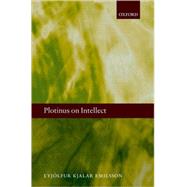
Plotinus on Intellect
by Emilsson, Eyjólfur KjalarBuy New
Rent Textbook
Rent Digital
Used Textbook
We're Sorry
Sold Out
How Marketplace Works:
- This item is offered by an independent seller and not shipped from our warehouse
- Item details like edition and cover design may differ from our description; see seller's comments before ordering.
- Sellers much confirm and ship within two business days; otherwise, the order will be cancelled and refunded.
- Marketplace purchases cannot be returned to eCampus.com. Contact the seller directly for inquiries; if no response within two days, contact customer service.
- Additional shipping costs apply to Marketplace purchases. Review shipping costs at checkout.
Summary
Table of Contents
| Introduction | p. 1 |
| Emanation and Activity | p. 22 |
| Internal and External Activity | p. 24 |
| One or Two Acts? | p. 30 |
| Motion and Activity in VI.1 and VI.3 | p. 34 |
| Absolute Motions | p. 38 |
| The Case of Walking and its Trace | p. 42 |
| Emanation and Internal and External Acts Again | p. 48 |
| The Sources of the Double Act Doctrine I: Aristotle | p. 52 |
| The Sources of the Double Act Doctrine II: Plato | p. 60 |
| The Genesis of Intellect | p. 69 |
| The Inchoate Intellect and its Conversion | p. 70 |
| Kinds of Plurality or Otherness | p. 78 |
| Analysis of V.3.10 | p. 80 |
| The Intellect's Undifferentiated Impression of the One | p. 90 |
| Pre-noetic Experience and Mystical Union with the One | p. 101 |
| The Two Kinds of Otherness Again | p. 103 |
| Self-Thinking and the First Person | p. 107 |
| Intellect and Being | p. 124 |
| Cognition, Images, and the Real | p. 124 |
| The Nature of Sense-Perception | p. 127 |
| Evidence for Subjectivism or Idealism | p. 129 |
| The Identity of Subject and Object in Intellect | p. 141 |
| The Puzzles of Ennead V.3.5: Self-Thinking Revisited | p. 144 |
| Being and Thought | p. 152 |
| The Difference and Identity between Subject and Object | p. 157 |
| Subordinate Intelligibles and Subordinate Intellects | p. 160 |
| Truth in Intellect | p. 165 |
| The Notion of the Given | p. 170 |
| Plotinus' Idealism | p. 173 |
| Discursive and Non-discursive Thought | p. 176 |
| Non-discursive vs. Discursive Thought: the Main Contrasts | p. 177 |
| Is Non-discursive Thought Propositional? | p. 185 |
| Non-discursive Thought and Perceptual Imagery | p. 191 |
| The Holism of Intellect | p. 199 |
| Discursive Thought's Dependence on Intellect | p. 307 |
| References | p. 214 |
| Index of cited texts | p. 221 |
| General index | p. 229 |
| Table of Contents provided by Ingram. All Rights Reserved. |
An electronic version of this book is available through VitalSource.
This book is viewable on PC, Mac, iPhone, iPad, iPod Touch, and most smartphones.
By purchasing, you will be able to view this book online, as well as download it, for the chosen number of days.
Digital License
You are licensing a digital product for a set duration. Durations are set forth in the product description, with "Lifetime" typically meaning five (5) years of online access and permanent download to a supported device. All licenses are non-transferable.
More details can be found here.
A downloadable version of this book is available through the eCampus Reader or compatible Adobe readers.
Applications are available on iOS, Android, PC, Mac, and Windows Mobile platforms.
Please view the compatibility matrix prior to purchase.
